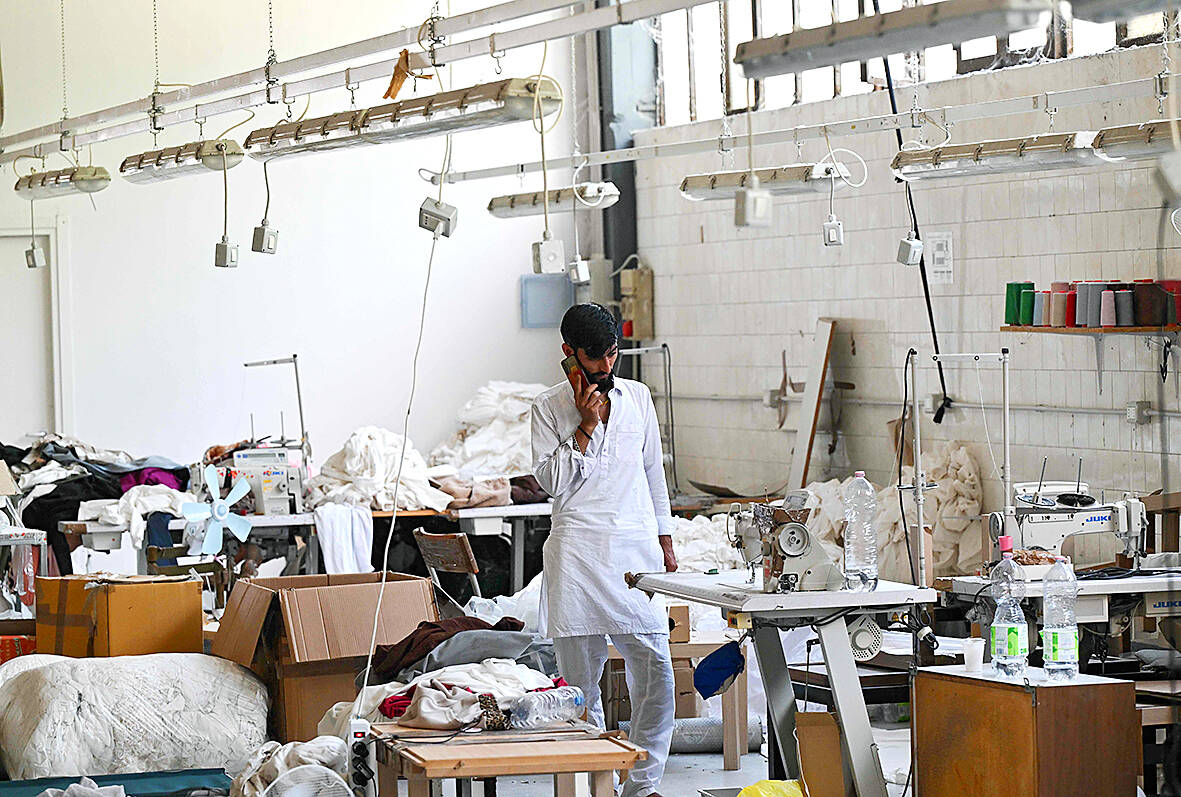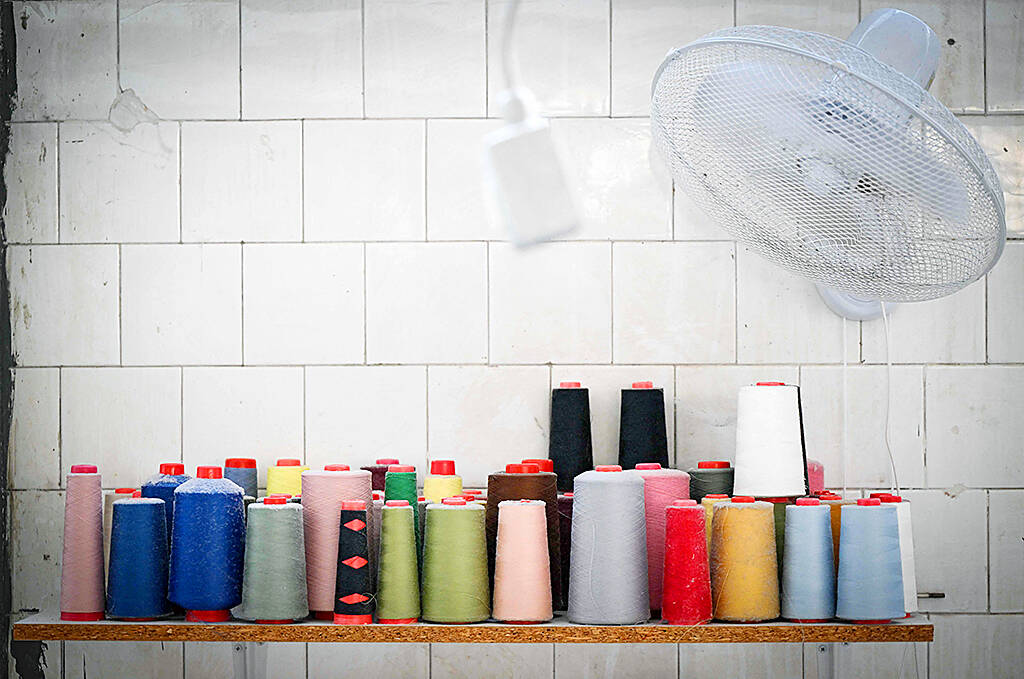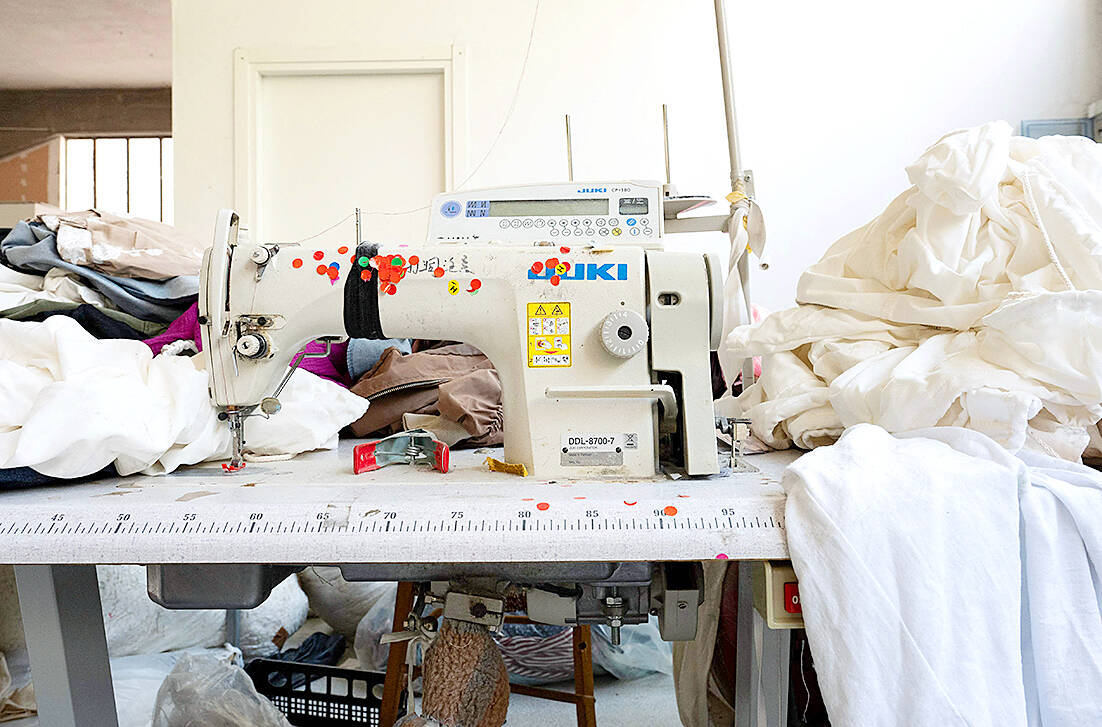When Zhang Dayong lay in a pool of blood on a sidewalk in Rome after being shot six times, few suspected a link to Italy’s storied textile hub of Prato.
But a “hanger war” is raging in the city near Florence — turning Europe’s largest apparel manufacturing center and a pillar of Made in Italy production into a battleground for warring Chinese mafia groups.
The situation has become so urgent that Prato’s prosecutor, Luca Tescaroli, has appealed to Rome for help, calling for an anti-mafia division and reinforcements for judges and police.

Photo: AFP
Tescaroli has warned that the escalation in crime has become a huge business operation and moved beyond Italy, notably to France and Spain.
The gangs are battling to control the production of hundreds of millions of clothes hangers each year — the market is estimated to be worth 100 million euros (US$115 million) — and the bigger prize of transporting apparel.
The Chinese mafia also “promotes the illegal immigration of workers of various nationalities” for Prato, Tescaroli said.

Photo: AFP
The veteran anti-mafia prosecutor said the “phenomenon has been underestimated,” allowing the mafia to expand its reach.
With one of Europe’s largest Chinese communities, the city of nearly 200,000 people has seen Chinese business owners and factory workers beaten or threatened in recent months, with cars and warehouses burned. The ex-head of Prato’s police investigative unit, Francesco Nannucci, said the Chinese mafia run betting dens, prostitution and drugs — and provide their Italian counterparts with under-the-radar money transfers.
For mafia leaders, “to be able to command in Prato means being able to lead in much of Europe,” Nannucci said.

Photo: AFP
‘WELL-OILED SYSTEM’
Chinese underworld groups thrive on the so-called “Prato system,” long rife with corruption and irregularities, particularly in the fast-fashion sector, such as labor and safety violations plus tax and customs fraud.
Prato’s 5,000-odd apparel and knitwear businesses, mostly small, Chinese-run subcontractors, churn out low-priced items that end up in shops across Europe.
They start quickly and shut down just as fast, playing a cat-and-mouse game with authorities to avoid taxes or fines. Fabric is smuggled from China, evading customs duties and taxes, while profits are returned to China via illegal money transfers.
To stay competitive, the sector relies on cheap, around-the-clock labor, mostly from China and Pakistan, which Tescaroli told a Senate committee in January was “essential for its proper functioning.”
“It’s not just one or two bad apples, but a well-oiled system they use, and do very well — closing, reopening, not paying taxes,” said Riccardo Tamborrino, a Sudd Cobas union organizer leading strikes on behalf of immigrants.
Investigators say the immigrants work seven days a week, 13 hours a day for about three euros (US$3.40) an hour.
Tamborrino said Prato’s apparel industry was “free from laws, from contracts.”
“It’s no secret,” he said. “All this is well known.”
‘MISS FASHION’
Trucks lumber day and night through the streets of Prato’s industrial zone, an endless sprawl of asphalt lined with warehouses and apparel showrooms with names like “Miss Fashion” and “Ohlala Pronto Moda.”
Open metal doors reveal loaded garment racks, rolls of fabric and stacks of boxes awaiting shipment — the final step controlled by Zhang Naizhong, whom prosecutors dub the “boss of bosses” within Italy’s Chinese mafia.
A 2017 court document described Zhang as the “leading figure in the unscrupulous circles of the Chinese community” in Europe, with a monopoly on the transport sector and operations in France, Spain, Portugal and Germany.
Zhang Dayong, the man killed in Rome alongside his girlfriend in April, was Zhang Naizhong’s deputy. The shootings followed three massive fires at his warehouses outside Paris and Madrid in previous months.
Nannucci believes Zhang Naizhong could be in China, after his 2022 acquittal for usury in a huge Chinese mafia trial plagued by problems — including a lack of translators and missing files.
On a recent weekday, a handful of Pakistani men picketed outside the company that had employed them, after it shut down overnight having just agreed to give workers a contract under Italian law.
Muhammed Akram, 44, saw his boss quietly take away sewing machines, irons and other equipment from the factory. “Sneaky boss,” he said, in broken Italian.
Chinese garment workers, who are often brought to Italy by the mafia, never picket, union activists say — they are too frightened to protest.
TRADING FAVORS
Changes in apparel manufacturing, globalization and migration have all contributed to the so-called “Prato system.”
So has corruption.
In May last year, the second-in-command within Prato’s Carabinieri police was accused of giving Italian and Chinese entrepreneurs — among them a chamber of commerce businessman — access to police data for information, including on workers.
Police complaints by workers “ended up in a drawer, never reaching the court,” said Sudd Cobas organizer Francesca Ciuffi.
Prato’s mayor resigned in June amid a corruption investigation, accused of trading favors with the businessman for votes.
In recent months, the union has secured regular contracts under national law for workers at over 70 companies.
That will not help those caught in Prato’s mafia war, however, where “bombs have exploded and warehouses have been burned down,” Ciuffi said.
“People who wake up in the morning, quietly going to work, risk getting seriously injured, if not worse, because of a war that doesn’t concern them.”

Google unveiled an artificial intelligence tool Wednesday that its scientists said would help unravel the mysteries of the human genome — and could one day lead to new treatments for diseases. The deep learning model AlphaGenome was hailed by outside researchers as a “breakthrough” that would let scientists study and even simulate the roots of difficult-to-treat genetic diseases. While the first complete map of the human genome in 2003 “gave us the book of life, reading it remained a challenge,” Pushmeet Kohli, vice president of research at Google DeepMind, told journalists. “We have the text,” he said, which is a sequence of

On a harsh winter afternoon last month, 2,000 protesters marched and chanted slogans such as “CCP out” and “Korea for Koreans” in Seoul’s popular Gangnam District. Participants — mostly students — wore caps printed with the Chinese characters for “exterminate communism” (滅共) and held banners reading “Heaven will destroy the Chinese Communist Party” (天滅中共). During the march, Park Jun-young, the leader of the protest organizer “Free University,” a conservative youth movement, who was on a hunger strike, collapsed after delivering a speech in sub-zero temperatures and was later hospitalized. Several protesters shaved their heads at the end of the demonstration. A

Every now and then, even hardcore hikers like to sleep in, leave the heavy gear at home and just enjoy a relaxed half-day stroll in the mountains: no cold, no steep uphills, no pressure to walk a certain distance in a day. In the winter, the mild climate and lower elevations of the forests in Taiwan’s far south offer a number of easy escapes like this. A prime example is the river above Mudan Reservoir (牡丹水庫): with shallow water, gentle current, abundant wildlife and a complete lack of tourists, this walk is accessible to nearly everyone but still feels quite remote.

In August of 1949 American journalist Darrell Berrigan toured occupied Formosa and on Aug. 13 published “Should We Grab Formosa?” in the Saturday Evening Post. Berrigan, cataloguing the numerous horrors of corruption and looting the occupying Republic of China (ROC) was inflicting on the locals, advocated outright annexation of Taiwan by the US. He contended the islanders would welcome that. Berrigan also observed that the islanders were planning another revolt, and wrote of their “island nationalism.” The US position on Taiwan was well known there, and islanders, he said, had told him of US official statements that Taiwan had not